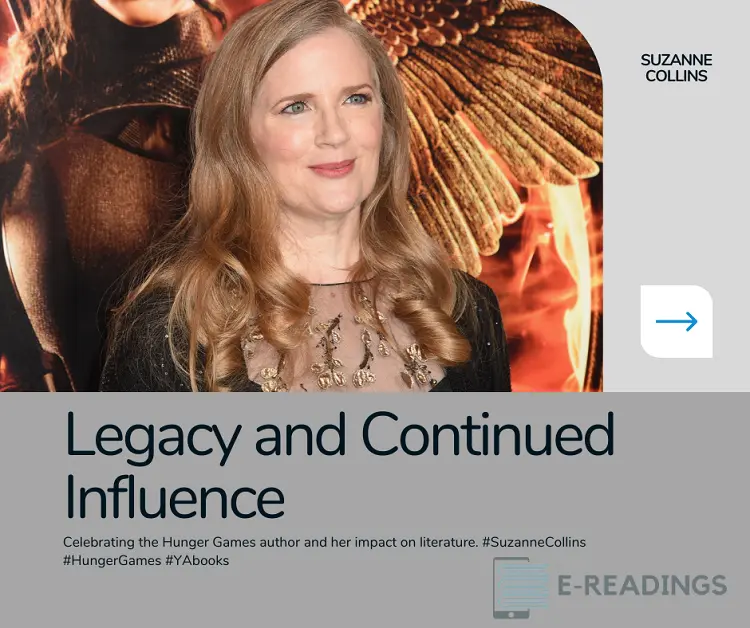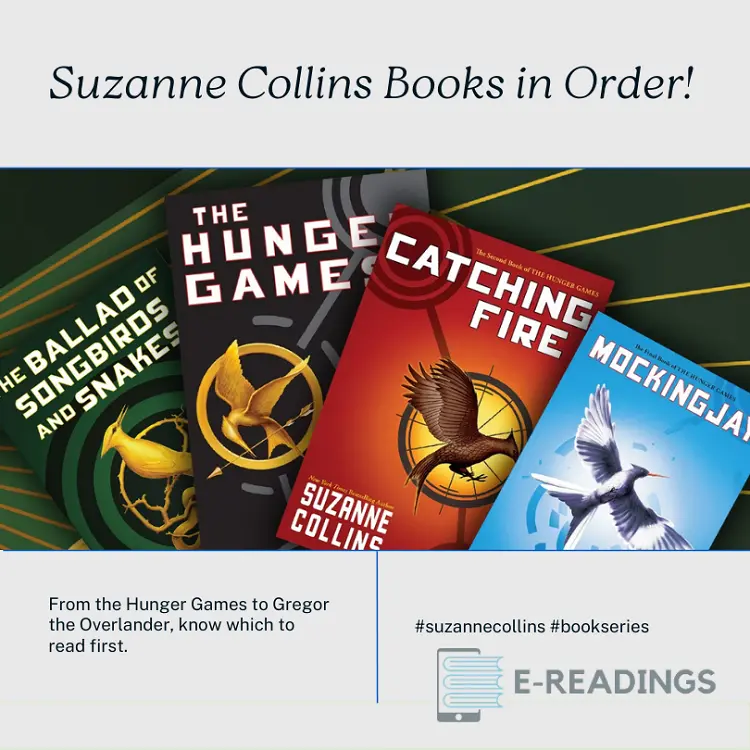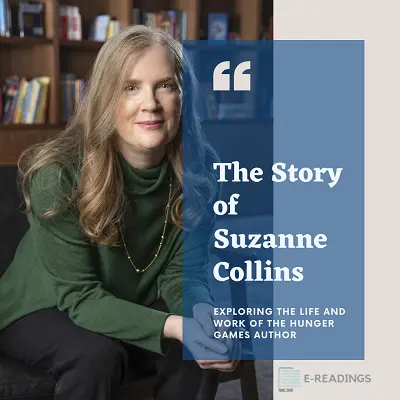From the pen of one eminent writer, Suzanne Collins—one whose work is passed on across generations. However, she made a tremendous impact in the world of literature by creating “The Hunger Games” trilogy, which has altered literature forever. The life, influences, and influence of Suzanne Collin will be explored in this paper, which gives a deeper understanding of the writing head behind the pen.
Suzanne Collins Biography:
As the child of an American Air Force officer who moved periodically within the US and worldwide, Sue had come to know war. Instead, her father also focused on the places, causes and changes in battles. After that, Collins pursued his education in theatre at Indiana University and emerged as a graduate in theatre with telecommunications. Soon after, she earned a playwriting degree at New York’s NYU before starting to work as a TV writer for Nickelodeon, Scholastic Entertainment and Kids’ WB.

Using this inspiration to create compelling children’s content led him to pen the Underland Chronicles. When she was watching TV and flipping channels between reality TV and war coverage, this is where the notion of her blockbuster series called The Hunger Games came about. Catching Fire and Mocking Jay formed a trilogy that became Collins’ global best seller, always assuring her in the history of writing.
Early Life and Education:
Suzanne Collins is her real name, and she hails from Hartford, Connecticut, where she was born on the 10th of August 1962 to a military family. The experience of travelling around extensively in her early years gave her a different perspective on things. Her exposure to such unpleasant realities during the growing stage when her father was a soldier planted the seed for the blooming in her writings as she grew older.
Collins’ intellectual road map was built on education. She studied theatre arts at Indiana University and sharpened her story-telling skills while obtaining a Bachelor of Arts. She used this academic background as a fire pit to fuel her creative dreams, and this laid the foundation for a future in children’s literature to turn it upside down.
Career:
Suzanne Collin got started in television writing for Nickelodeon, Scholastic Entertainment and Kid’s WB. Her talent in creating stories was first evident when the switch to writing for the children ensured she left a lasting footprint. Her skill in telling stories and involving young readers in the world of make-believe was showcased through “The Underland Chronicles”.
Yet, the world turned upside down for her when her blockbuster The Hunger Games trilogy came out in 2008. These novels combine elements of dystopia, survival, and revolt, and they go beyond the genre of literature that made Collins a star author. Collins became a pioneer in creative writing with the series of novels whose intriguing narrative and thought-provoking subject matter appealed to readers across generations.
Themes and Influences in Collins’ Writing:
The dystopian landscapes of Suzanne Collins are a fabric that illustrates the harrowing truth about war, class discrimination and many other miseries. The central theme in her literary vision is an unedited honesty stemming from her father’s war stories, lending poignancy to her tales. The strength and bravery of strong female leads such as Katniss can be attributed to Collins.
Listee: This is a direct result of technology making learning and communication effortless and faster for people worldwide. These characters make her storytelling more complex, but they also symbolise the inner courage and strength necessary for her worlds of fiction. In her work, thematic exploration by Collins crosses conventional barriers. She touches upon many current social dilemmas, raising serious questions regarding people’s lives.
Awards and Recognition:
Suzzane Collins’ influence in literature goes beyond mere best-seller books; numerous prestigious awards and accolades prove this. She is well known for writing and has received the Golden Kite Award, evidence of her significant influence on literature. She is most notable for securing a place as a New York Times best-selling author, which marks her contribution to the literary realm.
“The Hunger Games” is an iconic book of young adult literature that redefined the entire genre of this category of literature and turned into one of the most significant popular cultural symbols of all times. The depth of its analysis of power, rebellion and social structures inspired debates transcending the boundaries of fiction, highlighting Collins’ extraordinary talent for creating texts that almost spiritually impact readers.
Legacy and Continued Influence:
Collins’ impact goes beyond the fictional universe. These have inspired many writers and readers to discuss topical social issues. Collins made her mark in popular culture by adapting “The Hunger Games” into a hit movie trilogy.

Net worth:
Suzanne Collins is an American television writer and novelist with a net worth of $90 million. Apart from diversifying the literary field, Suzanne Collins is highly successful. Her wealth is a testimony to the worldwide fortune enjoyed by “The Hunger Games” franchise and how popular her narrative has been.
Interesting facts:
However, digging beneath the pages of Suzanne Collins’ works unveils fascinating information about her personality. We should also point out that “The Hunger Games” was inspired by the complex weave of Greek mythology. Her narratives become richly layered with different dimensions of meaning, making a dystopia a myth. An extra dimension is added to Collins’s storytelling because her background was shaped by growing up in a military family. Her upbringing resounds in her works, contributing to authentic and gritty storytelling. These aspects give depth to Suzanne Collins, who is not just an author but also becomes an inscribed character in the reading world.
Suzanne Collins Reading Order:
To go on a journey with literature by Suzanne Collins, moving forward from the very first line is necessary. Start with “Gregor the Overlander,” take a journey through the thrilling Hunger Games trilogy, and learn about her other pieces. In this sequential trip, she unfolds her storytelling ability. The reading order mention below:

Non-fiction:
- Year of the Jungle (2013)
The Hunger Games:
- The Ballad Of Songbirds And Snakes: A Prequel (2020)
- The Hunger Games (2008)
- Catching Fire (2009)
- Mockingjay (2010)
Mystery Files of Shelby Woo:
- Fire Proof (Book Eleven) (1999)
Picture Books:
- When Charlie McButton Lost Power (2005)
Underland Chronicles:
- Gregor the Overlander (2003)
- Gregor and the Prophecy of Bane (2004)
- Gregor and the Curse of the Warmbloods (2005)
- Gregor and the Marks of Secret (2006)
- Gregor and the Code of Claw (2007)
Conclusion:
Therefore, Suzzane Collins is an iconic novelist who invented a new way of storytelling through her “Hunger Games” trilogy. It is evident in her transitions, as she grew from a soldier’s daughter to literary renown through the transforming effect of her stories. Apart from the bestsellers list, Collins has won some awards and has instigated dialogues revolving around power, uprising, and systems.
Storyteller excellence is witnessed through some of her captivating realms, Panem and the Underland Chronicles. The persona of Collins is influenced by Greece mythology with a military background, which makes her narrations interesting in addition. Therefore, Suzanne Collins is more than an author; she is a visionary who will live on in literature as readers go through her work chronologically.
